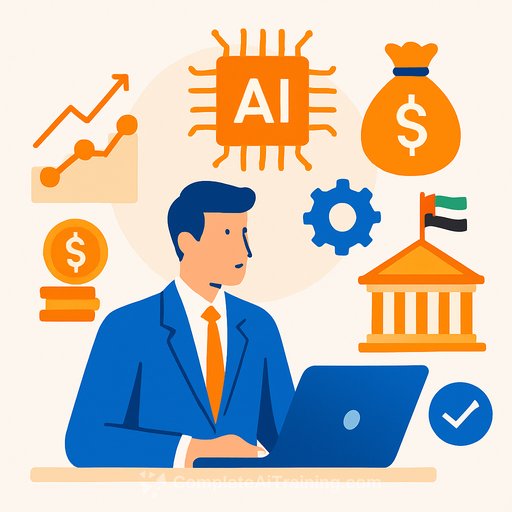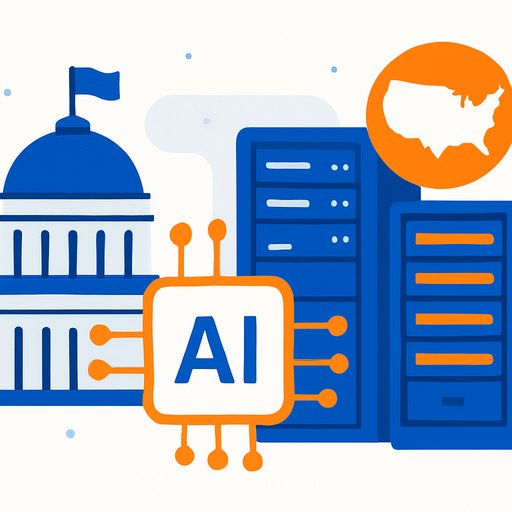How AI Is Helping Government Companies in the United Arab Emirates Cut Costs and Improve Efficiency
Too Long; Didn't Read: AI is enabling UAE government companies to reduce expenses and increase efficiency by automating workflows, centralizing identity management, and scaling sovereign cloud infrastructure. This progress aligns with the UAE AI Strategy 2031, which targets AED 335 billion in value. Key outcomes include eliminating over 336 million paper transactions, chatbots deflecting up to 80% of inquiries, and ICP renewals completed within 48 hours.
The UAE’s approach turns national strategy into tangible results. Government entities are accelerating service delivery by automating processes, centralizing digital identity, and building sovereign cloud capacity. Initiatives like UAE Pass and Dubai’s paperless campaign have removed millions of paper transactions, saving billions of sheets of paper. Digital IDs, interoperable data, and AI-powered chatbots reduce manual handoffs and shorten processing times across ministries.
A clear regulatory framework and active public-private partnerships support AI deployment across both onshore and free-zone jurisdictions. Training programs focused on practical AI skills help government teams and suppliers translate automation into measurable efficiency gains.
UAE National Strategy & Policy Driving AI Adoption
The UAE’s AI strategy is a well-structured policy engine converting ambition into clear objectives, procurement, and regulation. The National Strategy for Artificial Intelligence 2031 defines eight key goals and aims to generate AED 335 billion in value by 2031, with AI contributing up to 20% of non-oil GDP.
Policy tools include a dedicated UAE AI Office, sovereign cloud initiatives, ethical certifications, and national KPIs to fast-track pilot projects into scaled solutions. Talent development, secure data-sharing frameworks, and test environments encourage public sector adoption. Governance and AI risk-compliance measures ensure innovation stays compliant and resilient.
This coordinated approach creates benchmarks that allow ministries to measure cost savings and operational improvements as AI moves from pilot programs to everyday government functions.
How AI Cuts Costs and Improves Efficiency in UAE Government Companies
AI-driven automation is transforming routine government tasks into significant savings by moving interactions online and handling common queries before they reach physical counters. For example, the ICP (Identity and Citizenship Program) allows citizens to renew passports up to a year before expiry, doubling the previous window.
Renewals are completed fully online using the ICP smart services platform with UAE Pass login and document linkage, typically within 48 hours. This cuts queues, reduces rework, and eliminates costly last-minute expedited services.
Bilingual chatbots handle up to 80% of inquiries with contextual handoffs, lowering call center volumes and freeing staff to address complex cases. The result is fewer in-person visits, faster processing, and smaller operational teams for repetitive tasks — leading to less paper use, fewer counters, and smoother travel preparations for citizens.
Implementation Enablers: Partnerships, Sandboxes, and Talent
Scaling AI in the UAE happens through collaborative ecosystems rather than isolated efforts. Sovereign capital and national champions like MGX, backed by Mubadala and G42, lead co-investments and joint ventures with global players.
Microsoft’s $1.5 billion partnership with G42 and Nvidia-G42 data center deals bring onshore compute and sovereign cloud capacity. Sector-specific collaborations with Oracle, Cleveland Clinic, and others create real testbeds, especially in health and infrastructure. ADQ’s $25 billion joint venture with Energy Capital Partners targets 25 GW of new power capacity to support AI data centers — addressing a critical infrastructure bottleneck.
Talent development and governance frameworks also play a key role. Labs, the Responsible AI Foundation, and the increasing presence of Chief AI Officers (33% adoption in UAE firms) help bridge the gap from pilot to production.
Operational Examples: Digital Government, Health, Transport, and Energy
Dubai Electricity and Water Authority (DEWA) offers a practical example of AI integration. After adopting Azure OpenAI and Microsoft 365 Copilot, DEWA reduced document preparation times from days to hours, deployed the Rammas chatbot with over 9.2 million handled inquiries, and launched a 2025 framework to integrate generative AI across operations.
These initiatives boost productivity while maintaining 98% customer satisfaction and world-class reliability. Projects like automated business requirement document generation and mobile workforce assistance demonstrate how AI-driven analytics and bilingual chatbots reduce manual steps, speed decisions, and increase service availability.
Risks, Constraints, and Cost Considerations
While AI adoption produces efficiency gains, challenges remain. U.S. export controls and geopolitical shifts create uncertainty in procuring advanced chips. Security concerns exist around protecting frontier AI models and data.
Large-scale projects, such as a 5 GW Gulf AI cluster, raise risks related to single points of failure and hardware supply chains. Compliance and security measures add significant costs. For example, some firms have replaced $1.7–$2 billion in Chinese hardware to meet partner and regulatory demands.
The UAE’s export control regime imposes licensing, end-use checks, and penalties, increasing upfront costs and slowing procurement. These realities underscore the need for thorough due diligence and clear security protocols alongside efficiency efforts.
Practical Roadmap for UAE Government Companies Starting with AI
- Anchor AI initiatives to the UAE AI Strategy 2031 and leverage national platforms like UAE Pass and sovereign cloud for identity and data interoperability.
- Identify 2–3 high-impact pilots with measurable KPIs such as reduced turnaround times or call-center deflection.
- Develop a phased roadmap to move successful pilots from sandbox environments to scaled deployment.
- Establish governance and security protocols upfront to avoid procurement delays.
- Invest in talent development and public-private partnerships to close the gap between pilots and production.
- Measure outcomes closely with clear KPIs and iterate based on feasibility and return on investment.
For teams looking to build AI skills that translate directly to government workflows, practical courses on prompt writing and AI automation can accelerate impact. Resources like Complete AI Training’s prompt engineering courses offer targeted learning paths.
Measuring Outcomes and ROI of AI Projects
Link AI project KPIs directly to the UAE AI Strategy’s economic targets. Track service-level metrics such as turnaround time, call-center deflection rates, and paperless transaction volumes alongside infrastructure metrics like compute efficiency and energy consumption.
Use short-term ROI frameworks to identify value early—some industrial AI pilots show measurable workflow improvements within weeks, and cost reductions within six months. Benchmark conversational agents by deflection rates to quantify labor savings.
Operationalize value through tight A/B testing, centralized dashboards combining service KPIs with infrastructure costs, and unit economics like cost per completed transaction.
Conclusion: The Future of AI-Driven Efficiency in UAE Government
The UAE has the capital, strategy, and infrastructure to turn AI from pilot projects into sustained efficiency gains. Sovereign cloud and gigawatt-scale data centers reduce latency and enable high-value automation across services.
However, geopolitical risks and procurement complexities require careful governance, clear ROI measurement, and skilled teams fluent in prompt design and human oversight. Practical upskilling and solid governance frameworks ensure that AI deployments deliver repeatable cost savings and service improvements.
By combining infrastructure investment with disciplined execution and continuous measurement, UAE government companies can convert their AI initiatives into lasting operational success.
Your membership also unlocks:





